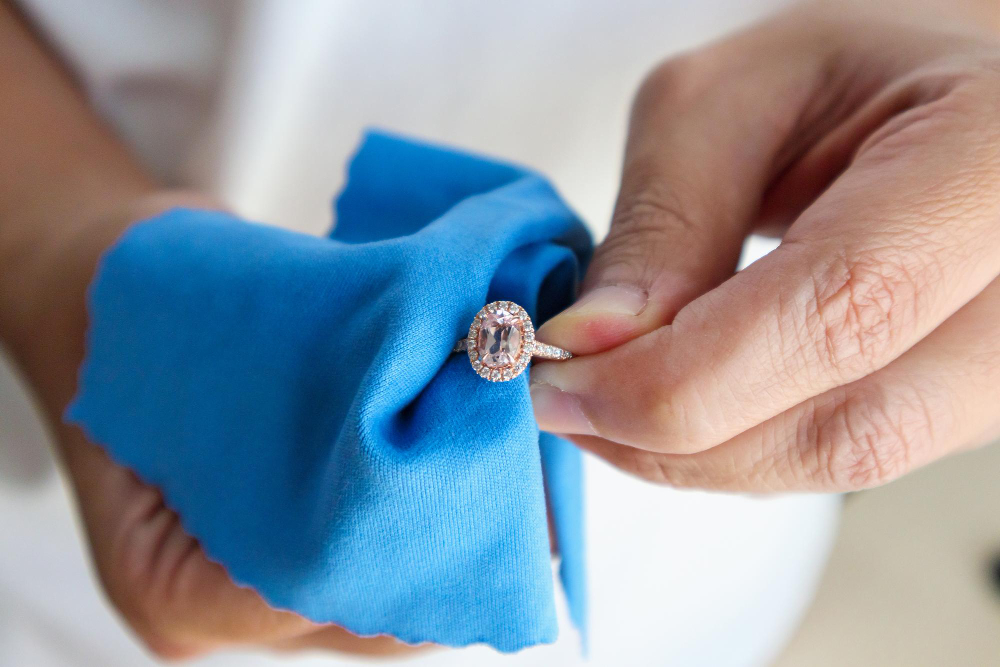For most people, buying jewellery is a significant investment. Individual pieces can cost thousands of pounds, so caring for them is essential.
But what’s the best way to do this? This post explores this question. It discusses the principles of keeping jewellery in good condition and various approaches people can take to maintain the collections without damaging them.
General Care Principles
The following section details various general care principles for looking after jewellery. These instructions will extend the lifespan of most pieces indefinitely.
Store Jewellery Separately
Experts recommend storing jewellery separately from other metal types and sharp objects to prevent scratching. Abrasion inside cases or tins can cause damage over time.
The problem is especially severe for high-carat gold items. 18K to 24K pieces are soft and ductile, making them more prone to damage when rubbing up against other objects.
Generally, owners should avoid keeping silver dainty rings next to gold bracelets. Jewellery made from harder metals, like tungsten, steel, or titanium, should always be kept separate.
Wear Jewellery After Applying Makeup And Perfume
Jewellery lovers should also don pieces only after applying makeup and perfume to avoid chemical contamination. Cosmetic compounds may contain caustic ingredients that damage metals or abrasive particles that scuff stones.
Keep Jewellery Away From Harsh Chemicals
Keeping jewellery away from damaging chemicals is another principle that helps it last longer. While precious metals, like silver and gold, have some resistance to acids and bleaches, they may not resist them perfectly.
Be particularly careful with gold vermeil and plated pieces. These are more prone to chemical degradation due to their delicate outer layers.
Put Jewellery In A Cold, Dry Place
Finally, it helps to keep jewellery in a cool, dry place out of sunlight. Maintaining these conditions reduces the risk of moisture, heat, or UV damage.
Pure gold will never tarnish or discolour. However, most jewellery is between 9K and 14K, meaning the actual gold content can be as low as 40%. As such, other metals in the alloy, like copper and nickel, can tarnish and degrade, affecting the piece’s beauty.
How To Clean Your Jewellery
Even with the best care, jewellery will sometimes get dirty. Particles will naturally accumulate in the crevices and grooves.
Fortunately, that’s okay: grime won’t harm jewellery immediately. But it can cause damage if left for months or years. This happens because dirt can contain substances that harm the metal or scratch the surface of jewels.
Wipe Regularly
You should wipe your jewellery with a lint-free cloth each time you wear it. Removing dust particles will prevent oily gunk from forming in the crevices, particularly on intricate rings and necklaces.
Ensure you do the wiping gently. You shouldn’t need to apply excessive force. If you do, use one of the cleaning methods outlined below. Pressing or rubbing too hard can cause the damage you want to prevent.
Soapy Water
If wiping gently doesn’t work, try cleaning your jewellery with soapy water or baby shampoo. This method lifts more dirt and grime than wiping with a dry cloth.
Start by adding some lukewarm water to a bowl with some gentle soap or baby shampoo. Mix it in until it develops a froth. Then, dip a soft brush into the solution to wet it before brushing the jewellery.
Generally, the smaller and softer the brush, the better. Tinier bristles get into more grooves and crevices, allowing you to give the jewellery a proper clean.
You can use larger brushes, but you may find it challenging to get into the head of rings (the part supporting the stone). Jewellers sometimes make these with intricately woven metal, making it hard to find a suitable cleaning angle.
As you clean the jewellery, you should notice a froth forming. Rinse this thoroughly with pure water at the end to remove any remaining soap suds.
Don’t use harsh chemicals like acids or bleach to clean jewellery. These can cause lasting damage.
Also, avoid using water or soap on softer gemstones, like pearls and opal. Scrubbing can damage their surface.
Professional Cleaning
Finally, consider professional cleaning for the most valuable pieces or those with intricate settings. Experts use specialist tools to let them get inside jewellery and scrub out all the gunk.
Most people take jewellery for cleaning once every two years or so. These sessions remove every fleck of dust and scrap of dirt, including in hard-to-reach areas around gemstones.

